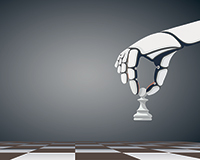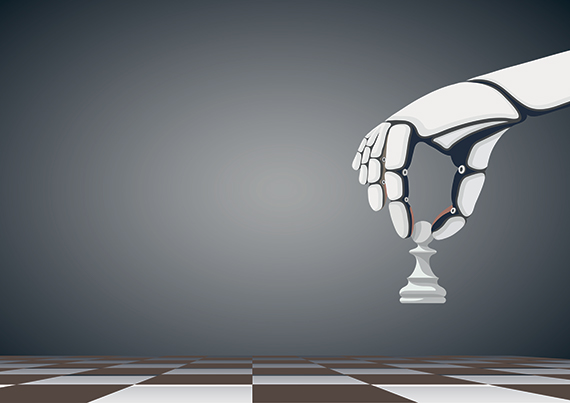 Tom Watson, co-founder and chief technology officer of Hubble, an online marketplace matching those who want office space with those who have it, explains why the robots are not coming to take our jobs in real estate
Tom Watson, co-founder and chief technology officer of Hubble, an online marketplace matching those who want office space with those who have it, explains why the robots are not coming to take our jobs in real estate
AI – or artificial intelligence – is a term used as clickbait, as a marketing tool, and, less often, as a way to describe groundbreaking technology that can revolutionise industries. I contend that AI will help, not hurt, the property industry.
The property industry has traditionally been opposed to new technology. There has always been a fear that tech will replace jobs and do a poor job of it. As humans, our natural instinct is to be scared of the unknown. It doesn’t help that the media paints both hyperbolically negative and positive pictures of new tech. Both of these viewpoints produce natural knee-jerk reactions.
However, technology has improved industries. It creates more jobs, not destroys them; it accelerates industry growth; and it improves customer experience. Artificial intelligence can do this for property.
AI is useful because of the significant amount of data available and the requirement to synthesise this data to provide the expertise property professionals trade on. Most of this is currently being done by humans to a varying degree of accuracy.
The main myth to debunk is that AI will completely replace property agents. This will never be the case. The best way to explain why is by using an example from chess.
Freestyle chess is a game where human players use machines to augment their abilities. They use AI to compute the probability of winning based on different moves. The machine then suggests to the player which move they should take. At this point, the player can choose to follow the machine’s instruction or not.
Players then combine the raw computing power of artificial intelligence with human nuance to defeat their opponent. The machine crunches numbers and probabilities while the player reads the opposition and weighs up tactics to then synthesise these results and choose the best path.
It turns out that freestyle chess players regularly outperform both chess grandmasters and machines. This mutual partnership of human and artificial intelligence produces better results than either individually.
Imagine now replacing “freestyle chess” with “property agency”. The next generation of agents will be able to use technology to their advantage. Using the vast quantity of data sets available, artificial intelligence can provide advanced recommendations to potential tenants, give accurate property valuations and more.
Agents will then be able to combine these insights with their own understanding and expertise to provide further value to their customers. What’s more, by replacing a lot of their workload with technology, they will be able to work more efficiently, service more customers asynchronously, and at greater speed, without reducing quality.
But artificial intelligence can’t replace the entire process. In addition to performance increases, there is another insight that can also be drawn from chess.
No-one likes watching computer vs computer chess (yes, some people like watching chess), even though these games are of a higher ability and skill level than a normal human game. It turns out we get far less emotionally attached to the outcomes of these games and thus they are less enjoyable.
A similar thing happens with robo-advisers. This wave of tech-enabled advisers can replace a lot of the human interaction within a transaction. However, customers still require human contact.
For example, a property transaction is an event of large importance, and high capital risk. It requires significant expertise.
Because of this, customers need to build trust with an adviser whom they can hold accountable if something goes wrong. Our own internal biases make this trust a lot easier to build with flesh and blood than with lines of code.
This is especially true as transaction sizes increase. The need to have human interaction will decrease over time, however, as we get more comfortable placing our future in the metaphorical hand of machines.
The best freestyle chess players are not grandmasters and do not have machine-learning doctorates. The best freestyle chess players are those who are good chess players and who also understand how the machine works. They can understand how the computer calculated the suggested move, understand the weaknesses in that calculation and apply their knowledge to improve the solution.
The best agents will be those who can do the same. They will no longer be the classic salesmen or women; instead they will be those who can best understand the customer and apply technology to find the best solution.
Technology and artificial intelligence will displace jobs. Increases in efficiency mean fewer agents can handle more customers.
Customers will gravitate towards the best people, and fewer people will be able to service the same amount of demand.
However, this is job displacement, not replacement. AI will open up new opportunities in tech for those willing, and agents will need to reskill if they want to compete.
Embracing new technology is not something that the industry has been good at historically, although it is getting better. We are starting to see large property technology companies emerge with products used by large corporations. This behaviour is encouraging even more people to start up.
Artificial intelligence can have a profound impact on this industry for the better. It can reduce inefficiencies and improve the customer experience. It can benefit agents and not replace them; it can encourage human interaction and not discourage; and this can be achieved without requiring huge layoffs.
That’s not to say there won’t be casualties. There will be, as those who cannot adapt are forced to leave and are replaced by those seeking this land of new opportunities.
But the agents and property companies that will win will be those who embrace the change the quickest.
Interact with Watson on Twitter using @watsontom100












